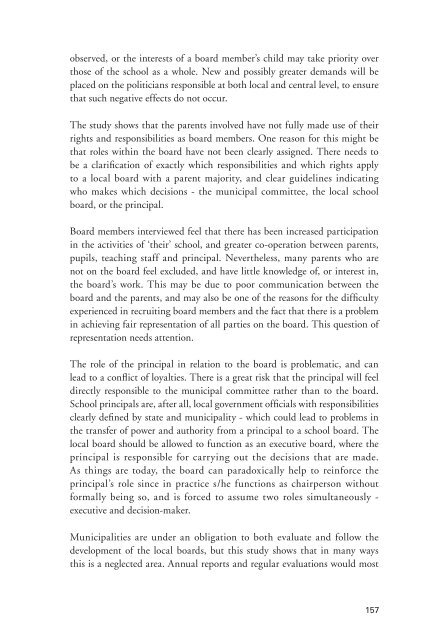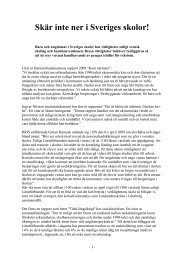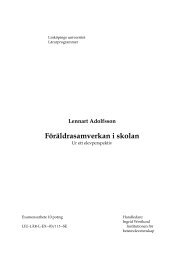Föräldrainflytande i grundskolan - Barnverket
Föräldrainflytande i grundskolan - Barnverket
Föräldrainflytande i grundskolan - Barnverket
You also want an ePaper? Increase the reach of your titles
YUMPU automatically turns print PDFs into web optimized ePapers that Google loves.
observed, or the interests of a board member’s child may take priority over<br />
those of the school as a whole. New and possibly greater demands will be<br />
placed on the politicians responsible at both local and central level, to ensure<br />
that such negative effects do not occur.<br />
The study shows that the parents involved have not fully made use of their<br />
rights and responsibilities as board members. One reason for this might be<br />
that roles within the board have not been clearly assigned. There needs to<br />
be a clarification of exactly which responsibilities and which rights apply<br />
to a local board with a parent majority, and clear guidelines indicating<br />
who makes which decisions - the municipal committee, the local school<br />
board, or the principal.<br />
Board members interviewed feel that there has been increased participation<br />
in the activities of ‘their’ school, and greater co-operation between parents,<br />
pupils, teaching staff and principal. Nevertheless, many parents who are<br />
not on the board feel excluded, and have little knowledge of, or interest in,<br />
the board’s work. This may be due to poor communication between the<br />
board and the parents, and may also be one of the reasons for the difficulty<br />
experienced in recruiting board members and the fact that there is a problem<br />
in achieving fair representation of all parties on the board. This question of<br />
representation needs attention.<br />
The role of the principal in relation to the board is problematic, and can<br />
lead to a conflict of loyalties. There is a great risk that the principal will feel<br />
directly responsible to the municipal committee rather than to the board.<br />
School principals are, after all, local government officials with responsibilities<br />
clearly defined by state and municipality - which could lead to problems in<br />
the transfer of power and authority from a principal to a school board. The<br />
local board should be allowed to function as an executive board, where the<br />
principal is responsible for carrying out the decisions that are made.<br />
As things are today, the board can paradoxically help to reinforce the<br />
principal’s role since in practice s/he functions as chairperson without<br />
formally being so, and is forced to assume two roles simultaneously -<br />
executive and decision-maker.<br />
Municipalities are under an obligation to both evaluate and follow the<br />
development of the local boards, but this study shows that in many ways<br />
this is a neglected area. Annual reports and regular evaluations would most<br />
157






